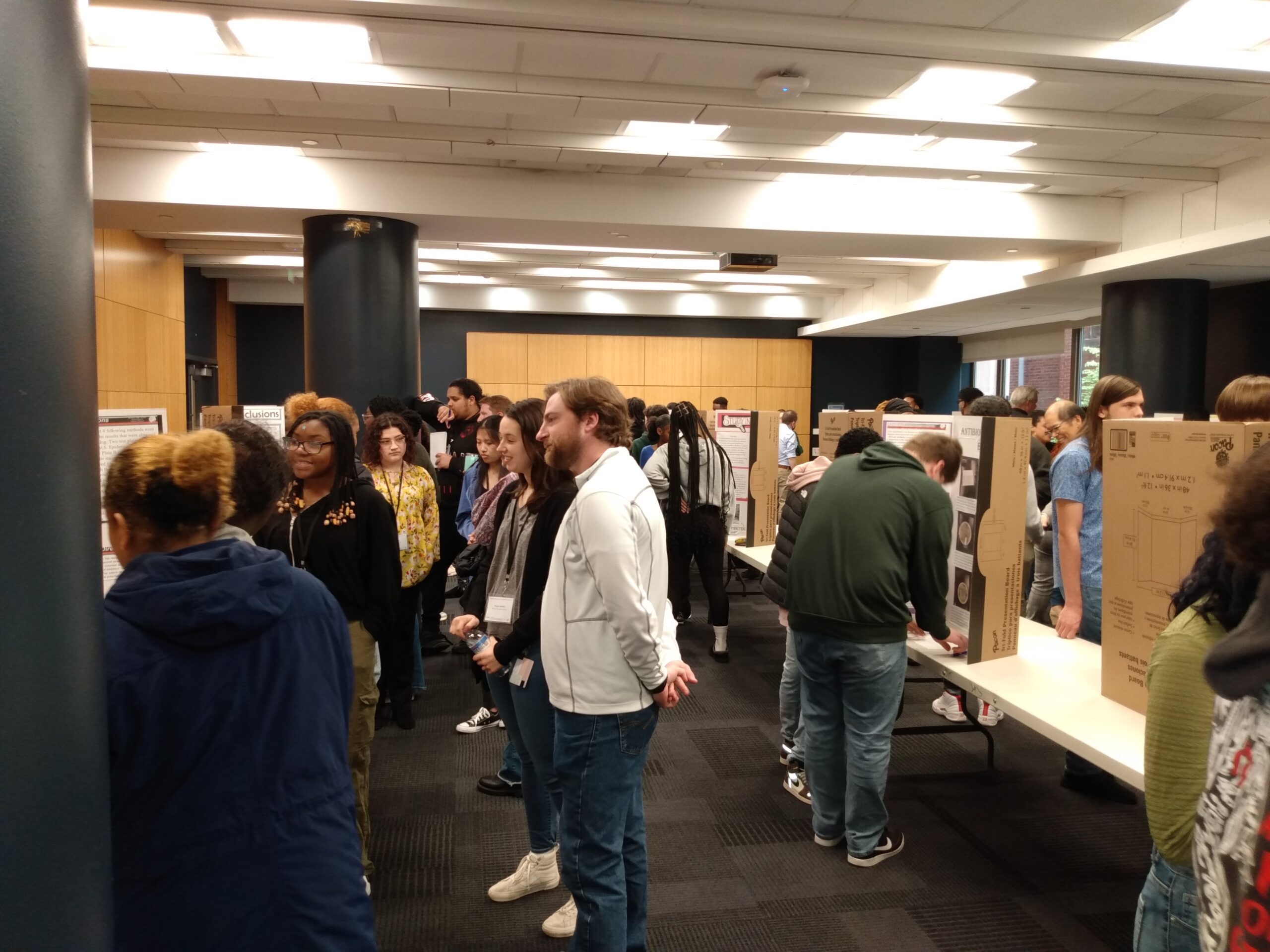Superbugs From Their Backyards and Beyond: Brockton High Schoolers Present “Tiny Earth” Findings to Levy CIMAR; Tufts Community

May 9, 2023
Rima Mycynek
The Stuart B. Levy Center for Integrated Management of Antimicrobial Resistance hosted 73 students from Boston-area Brockton High School last week for a scientific poster session where the students presented their unique findings after surveilling antimicrobial resistant (AMR) bugs in their own backyards and around Brockton, and culturing them in the lab.
AMR is ranked among the World Health Organization’s top 10 threats to global health and occurs when antimicrobial treatments such as antibiotics become ineffective against the microorganisms they were created to fight. These microorganism “superbugs” adapt to survive drug treatments, causing infections to persist and spread. AMR bugs can be found all around us, including in our drinking water and in our soil, as the Brockton High students demonstrated with their poster presentations.
The students’ findings are part of the Tiny Earth project, a research course originally designed by University of Wisconsin-Madison faculty for college students to discover antibiotics from soil bacteria. Brockton is the first public high school in the country to adopt the curriculum.
Students presented their data to a wide audience of Tufts University and Tufts Medical Center graduate students, postdoctoral fellows, faculty, and clinicians, and to members of industry, including Ken Lawrence, PharmD, Executive Director of Seres Therapeutics in Norfolk, Mass., and David Cosman, PhD, who was part of the team at Immunex that developed the drug Enbrel® and other drugs for the treatment of autoimmune diseases, osteoporosis, and cancer. Dr. Cosman currently serves on the board of directors for Earth Economics, a non-profit global leader in science-based economics.
The event posed a rare educational and networking opportunity to the high schoolers. Science Department Head Dave Mangus, PhD, Biotechnology Lead Teacher Laurie Jackson-Grusby, PhD, and teacher Danielle Lambert, have developed a unique educational program at the school that includes getting students out of the classroom and into the lab for hands-on scientific research. The four-year program also allows students to explore fundamental concepts in biology via an engineering perspective (e.g., genetic engineering, synthetic biology, and biomimicry). Students spend the first two years of this program learning these concepts, and in their third year, they explore chemistry using a forensics theme. They then finish the program with an original capstone research project in their senior year. Now in its 11th year, the program has grown dramatically and currently serves about 350 freshmen through seniors.
“Tufts faculty, staff, and students were so kind to spend time celebrating our students’ work and encouraging them in their academic careers,” says Mangus. “Their patient questions promoted self-confidence as many realized they knew more that they thought they did. Opportunities like this help broaden our student’s horizons, see themselves in STEM careers, and enrich the biotechnology ecosystem of the Commonwealth in doing so.”
The Levy CIMAR first welcomed Brockton students to Tufts for a full Science Outreach Day in 2019. Prior to the COIVD-19 pandemic, this was intended as an annual event. With the success of the 2023 poster session, Levy CIMAR leadership hope to bring Brockton students—and students from other area high schools—back to Tufts more regularly.
The Levy CIMAR also remains committed to high school outreach by engaging in programs such as the Prevalence of Antibiotic-Resistant microbes in the Environment (PARE) project, developed by core faculty member Carol Bascom-Slack, PhD. The Center is also heavily involved in the Lab Science Investigations course at Tufts, developed by core faculty member Revati Masilamani, PhD.




